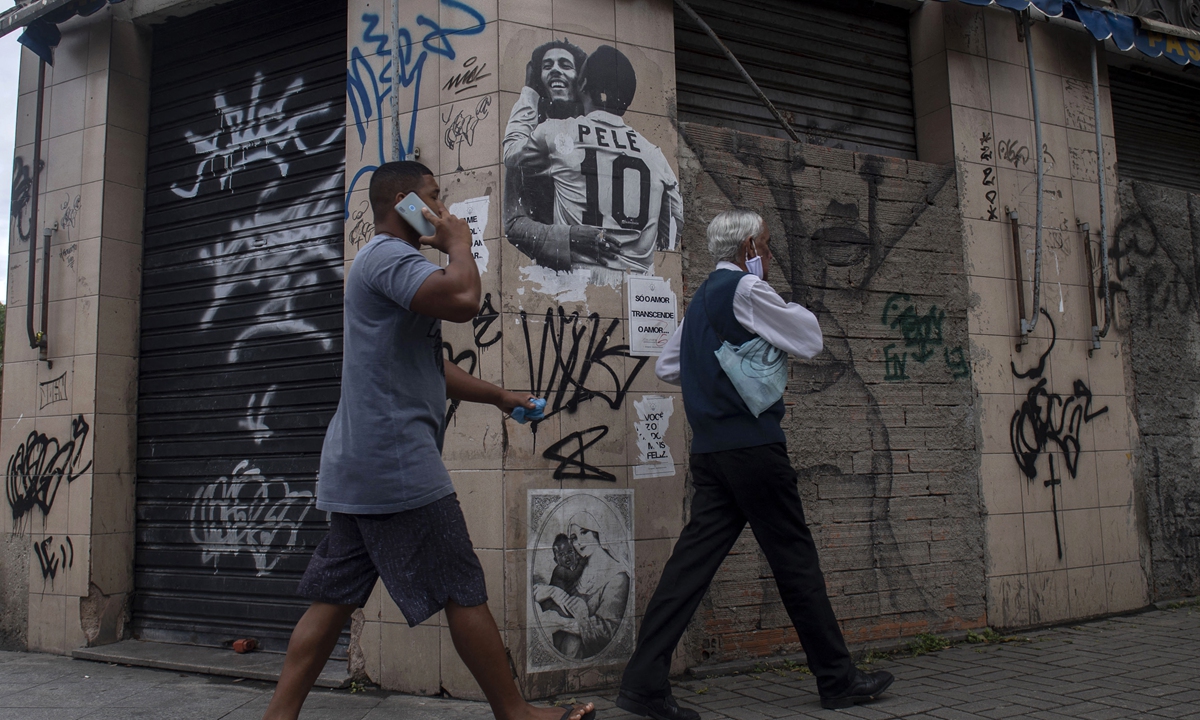ARTS / MUSIC
40 years on, Bob Marley’s rich legacy thrives
Burning bright

On December 8, 2020, men walk past the wall of a closed bar in Rio de Janeiro with poster art of late Jamaican singer Bob Marley and former Brazilian soccer player Pele hugging each other. Photo: AFP
It's been four decades since Bob Marley's death, a period longer than the reggae icon's brief but potent life that skin cancer ended when he was 36.Yet Marley lives on as a voice of the dispossessed, the palpable vibrancy, spirit of protest and moral zeal of his songs including "One Love," "Redemption Song" and "I Shot The Sheriff" enduring in a way few bodies of popular music have ever done.
His rich anthems of peace and struggle, hope and discontent, still reverberate globally and especially in his native Jamaica, a small nation whose rich culture its most famous son popularized around the globe.
"It is said the brightest stars sometimes don't burn as long and, in many ways, Bob Marley was our brightest star; he accomplished a lot in a short period of time," said Judy Mowatt, an original member of the influential I-Threes trio whose vocals backed Marley.
"Looking back now, I believe in many ways, he was before his time," Mowatt told AFP.
"His words have been prophetic. He was a man who believed everything he sung."
Marley was diagnosed with acral lentiginous melanoma in 1977, which was first discovered underneath a toenail when he suffered a foot injury playing soccer.
He opted against doctors' recommendations that he amputate his toe, a procedure that would have violated his staunch Rastafarian faith.
While in New York in 1980 to perform two shows at Madison Square Garden, Marley collapsed during a Central Park jog. He was rushed to the hospital, where doctors found the cancer had crept into his brain, lungs and liver.
Marley performed what would be his final show in Pittsburgh on September 23, 1980. Not long after, he cut his tour short and underwent months of ultimately unsuccessful alternative cancer treatment in Germany.
On his way home to Jamaica to receive one of his nation's highest awards, the Order of Merit, Marley's condition worsened. He landed in Miami to seek emergency treatment.
"Money can't buy life," he reportedly told his son Ziggy from his hospital bed before his death on May 11, 1981, 40 years to the day on Tuesday.
Learning of Marley's death is a moment seared into Mowatt's consciousness.
"It was a Monday morning, sitting on the veranda like I am now, and I got the phone call that Bob passed," she said. "It was very painful. All the years we have worked together has come to a closure and it just hit me.
"Bob was gone forever."
Marley was given a state funeral in Jamaica on May 21, 1981, that combined elements of Ethiopian Orthodox and Rastafari tradition. He was eulogized by former Prime Minister Edward Seaga and buried in a chapel near his birthplace, with his guitar.
The year 2021's 40th anniversary of Marley's death is particularly poignant, as 2021 marked the death of the last surviving member of the original Wailers, Bunny.
"This is the first year that we are memorializing Bob's transition anniversary from 1981 in the context of all three Wailers leaving, Peter [Tosh] having left in 1987, and Bunny surviving them both for 40 years and 33 years respectively, transitioning here in 2021," Maxine Stowe, Bunny Wailer's long-time manager, said.
The Wailers "are now reunited in another plane of existence," Stowe said.



